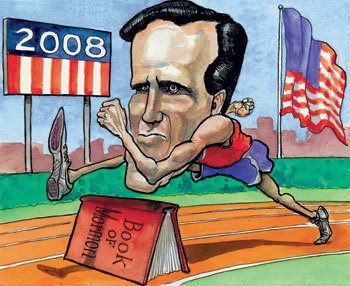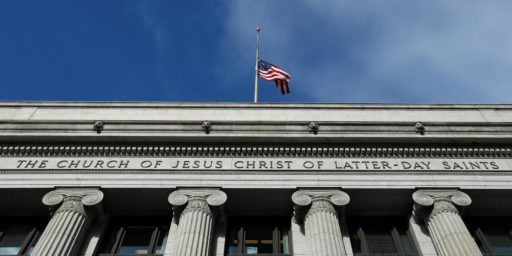“Swift Assimilation” and History
Ross Douthat's latest New York Times column demonstrates an appalling misunderstanding of history in the context of immigration.

Ross Douthat’s latest column on the history of immigration is getting a lot of buzz in the blogosophere, notably for its fantastically simplistic view of the current issues involving the integration of Muslims into American society. But there are a number of other problems with Douthat’s view of integration in this column–notably his apprent complete lack of understanding of the historical issues surrounding immigration in this country, and his glossing over of a number of atrocities committed in the name of integration.
You can actually see this perspective in one of the early paragraphs:
The first America tends to make the finer-sounding speeches, and the second America often strikes cruder, more xenophobic notes. The first America welcomed the poor, the tired, the huddled masses; the second America demanded that they change their names and drop their native languages, and often threw up hurdles to stop them coming altogether. The first America celebrated religious liberty; the second America persecuted Mormons and discriminated against Catholics.
But both understandings of this country have real wisdom to offer, and both have been necessary to the American experiment’s success. [emphasis added]
As you might suppose from this, Douthat immediately starts off by defending the “second America”‘s persecution and discrimination of immigrant populations.
For example, in discussing immigration in the late 19th and early 20th centuries, Douthat notes:
During the great waves of 19th-century immigration, the insistence that new arrivals adapt to Anglo-Saxon culture — and the threat of discrimination if they didn’t — was crucial to their swift assimilation. The post-1920s immigration restrictions were draconian in many ways, but they created time for persistent ethnic divisions to melt into a general unhyphenated Americanism.
This is complete and utter nonsense. First off all, you’ll note that Little Italy’s and Chinatowns still exist all over the country. There are neighborhoods on the East Coast where you’re lost if you don’t speak Italian, and neighborhoods on the West Coast where you’re lost if you don’t speak Chinese. There are people living in these neighborhoods who are still hostile to outsiders, and lots of different ethnic neighborhoods share this characteristic.
And it’s important to realize that these ethnic enclaves, with their insularity and hostility to integration, not only failed to “swiftly assimilate”, they failed to swiftly assimilate because of discrimination. Because of the law and because of cultural prejudice, Italians, Chinese, Irish, Slavs, Jews and other immigrants were very often not hired by their neighbors. As a consequence, Italians hired Italians, Chinese hired Chinese, Irish hired Irish, etc. Immigrant neighborhoods were often either ignored by the police or shaken down by them for protection money. In either case, in a desperate desire for order, immigrants turned to organized crime for protection from criminals or the police. While the Mafioso were brutal, greedy and ruthless, they also kept order on the streets and took care of widows, etc. (You can actually see a similar pattern in Palestine, where Hamas was voted into power as not only a reaction against Israel and the PLO, but also because while Arafat’s government was growing rich and corrupt on foreign aid payments, Hamas was building schools and medical clinics for the destitute.)
Indeed, the combination of the rise of organized crime and the hositility from “second America” more likely delayed the integration of immigrant communities. That integration really didn’t start to happen until various immigrant populations simply became numerous enough to vote their preferred candidates into office, such as the experience of the Irish in Boston.
Another example of Douthat’s willful glossing over of history comes in his discussion of the Mormon experience:
The same was true in religion. The steady pressure to conform to American norms, exerted through fair means and foul, eventually persuaded the Mormons to abandon polygamy, smoothing their assimilation into the American mainstream.
This is a great example of how to write something that’s factually true, but rhetorically false. Given his tone, you’d think that Mormon families were getting some glares and “tsks tsks” at PTA meetings. The reality, of course, is that Mormons were violently persecuted, first by their neighbors in Illinois and Missouri, and then by the U.S. Army after they moved to Utah. The Mormons weren’t “persuaded” to abandon polygamy, they were forced to after the United States Congress disincorporated the Church and seized all Mormon assets. Mormon leaders fought the Act in the Courts, but the Supreme Court ultimately upheld Congress’ Act. It was only then that the Mormons capitulated to the government. And it was a long time before Mormons got over that and became more assimilated into every day American life. And even at that, there was considerable hostility among quarters in the Republican Party against Mitt Romney because of his religion.
I definitely agree that, as a culture, Americans should encourage the integration of immigrant populations into every day life. But that integration isn’t built on fear and peer pressure. It’s built on tolerance, a shared ideal of freedom, and the embrace of new cultures into the rich tapestry of American life. Integration comes from delicious foods at Indian buffets and the required learning about American government before an immigrant takes his oath of citizenship. It certainly doesn’t come from protesting Mosques or putting up No Irish Need Apply signs on the door of your business.






I live in Brazil, in the state with higher proportion of immigrant population. I´m myself grandson of Japanese immigrants, and more than half of the people that are in the room where I´m writing
“Ross Douthat’s latest New York Times column demonstrates an appalling misunderstanding of history…”
You could say that about almost all of Douthat’s stuff.
And sadly, he’s one of the least crazy Republican “intellectuals.”
Well, Alex, in an earlier comment, I cited Douthat’s distinction with favor, feeling it did capture the split in thinking pretty well. And I said this:
“This second America, the Know-Nothing America, always loses in the end. It doesn’t lose primarily because of the nutzoid xenophobia of its leading lights, though they do make their contributions. No, the second America loses because, and this is something it’ll never get, it wins. It wins because of the tradition-dissolving force of American culture:Your grandparents may speak only Yiddish, Arabic, Spanish — you do not. Your grandparents may take the Torah, the Koran, the New Testament as the final word — you do not. Your grandparents may have one foot in the Old World, one foot in the New. Your feet are planted firmly in the New. The real error of the modern Know-Nothings is their lack of understanding and appreciation of the real American culture and it profoundly assimilationist nature. Basically, they show a lack of faith in this country engendered by ignorance of its history.”
I was relying on my family’s experience and that of the families of many of my friends. I’m not denying the, in many instances, rocky road scenario you outline, but my point was, while the second America demands assimilation, but many, many times roadblocks it, the underlying American tradition, one they seem to be ignorant of, is assimilationist. And is so in spite of the resistance of those who demand assimilation. I do agree, though, that the assimilation was not swift in every case, but it was and is inexorable. I believe the American idea, or rather, the idea of being an American, in the end trumps ever attempt to defeat it.
I agree that the Mormons are a particularly bad example of persecution “promoting” integration. I’d add that it’s often argued that polygamy only became a common cultural practice for the Utah Mormons as a result of violent persecution — that the widespread adoption of the patriarchal system was a practical response to the challenges of organizing the westward migration and establishing a new society in Utah.
Though the Utah Mormons attempted to give polygamy religious legitimacy by claiming it was already being practiced on a modest basis in Illinois before they fled, polygamy was rejected by Mormons who declined to follow Brigham Young but stayed behind in Missouri, etc. The Utah Mormons were not only free to practice polygamy in their new persecution-free environment, they had many socio-economic incentives to do so that were directly shaped by the religious persecution they experienced.
So the simple, but very plausible counter-factual is: no violent persecution, no signficant practice of polygamy in the first place.
Douhat’s column was a fairly substantial exercise in intellectual dishonesty (something he regularly resorts to in order to justify outrageous behavior on the right). I particularly liked his claim that the forces of intolerance and bigotry were a source of wisdom.
Douthat, surprisingly for him, decided to rationalize an emotional decision. It doesn’t ring true, nor do I think that if he reads it a month for now, he will be very proud of this work.
This argument is becoming the perfect illustration a very simply dividing line — either you think Islam is the enemy or you think that our enemies are using Islam as the justification for their hate.
(I guess there is also a third category — you believe that you can demagogue the issue to your political benefit, which frankly is the worst of the three.)
Describing things as they are is not intellectually dishonest or rationalizing. There in fact are the two Americas of which he speaks. I read his statement about having ‘real wisdom to offer’ as coming to understand the two Americas offers the wisdom. Know that there are two and you will have a better insight into what’s going on. The elite don’t understand and don’t want to understand the rest of America and instead merely dismiss them and insult them.
Historical precedents can be useful but in today’s world we are too interconnected to really expect all our immigrants to be like the Chinese in the California gold rush or the Italians of a hundred years ago. Immigrants today are very different than back then.
In this case we are talking about specific immigrants and the religion they bring. A religion that can be labeled intolerant by rational, reasonable people. Why is it wrong to ask for some changes and why is it wrong to apply a little peer pressure? We’re not talking about cuisine or native garb. In some cases we’re talking about supporting overseas terrorist organizations, honor killings, and yes, even building a mosque in a place that offends people who lost loved ones. Is that really to much to ask? Is it really that hard to assimilate enough so you build bridges rather than burn them?
What? A conservative “intellectual” bending over backward, rewriting history, twisting facts all in order to excuse the creeping evil at the heart of his party? Wow. That’s just a huge . . . um. . . okay, it’s not a surprise at all.
Conservatives don’t give a damn about principle. There was a time when they did, but that is long past. A conservative intellectual exists now to pander to the extremes and invent bogus rationales for bigots. Everything else is window dressing.
And no, it’s not the same for liberals. We don’t require a steady diet of hate and an endless supply of scapegoats. Liberals are often stupid and naive and weak. But they don’t go looking for people to hate in order to prop up a party structure. We still believe in things. You may not like the things we believe in, but none of them involve finding excuses for racial, gender or religious hatred.
Plunk — Any religion can be labelled as intolerant or even evil by those who don’t follow it — and just about every one has. That doesn’t make the labelling right, and it doesn’t mean those who do follow that religion should accept second class status from those who believe that they are superior because they were taught a different set of creation myths.
>>Describing things as they are is not intellectually dishonest or rationalizing.
If only somebody would.
>>There in fact are the two Americas of which he speaks.
There are indeed 2 Americas, if only he would speak of them….
>>The elite don’t understand and don’t want to understand the rest of America and instead merely dismiss them and insult them.
Absolutely correct.
>>Immigrants today are very different than back then.
No they aren’t. They are just like my grandparents, (except, when the new immigrants speak english, I can understand them)
>>In this case we are talking about specific immigrants and the religion they bring.
Ya know… The same thing was said about my grandparents… except they called them “Papists”, now they say Muslim…
>>A religion that can be labeled intolerant by rational, reasonable people.
I recall the same thing being said about grandma…
>>Why is it wrong to ask for some changes and why is it wrong to apply a little peer pressure?
I refer you to the First Amendment Steve. Is you is, or is you ain’t?
>>Is that really to(o) much to ask?
I already know Steve, but you tell me… In the meanwhile, I have a question for you: If somebody wanted to build a Christain church on this site, would you object as much?
“In the meanwhile, I have a question for you: If somebody wanted to build a Christain church on this site, would you object as much?”
Of course he wouldn’t…which brings us to the nub of the problem here…someone needs to explain how the actions of one terorrist group indict a whole religion…al-Qaeda is no more synonymous with Islam than the IRA is synonymous with the Catholic Church or David Koresh is synonymous with Protestant Christianity…obviously this is quite difficult for some people to grasp…
tom p, The first amendment forbids government intervention into the free exercise of religion. I’m merely talking about public pressure for sensitivity on this issue, not government getting involved.
AIP, Thanks. Perhaps I should let you speak for me and every other conservative since you already know what we will say. It matters less of what I say as why I say it but that’s lost on liberals who can’t seem to understand any other view but their own. Let me put it this way, if Christians hijacked an airplane and flew it into a building in Calcutta killing thousands of Hindi I would strongly object to other Christians building a church near the site. Get it?
wr, Of course any religion can be labeled intolerant but what religion is genuinely intolerant to Western ideals and the basic human rights we have granted?